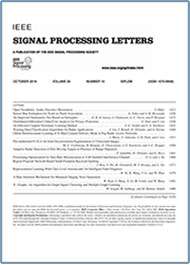- Our Story
- Publications & Resources
- Publications & Resources
- Publications
- IEEE Signal Processing Magazine
- IEEE Journal of Selected Topics in Signal Processing
- IEEE Signal Processing Letters
- IEEE/ACM Transactions on Audio Speech and Language Processing
- IEEE Transactions on Computational Imaging
- IEEE Transactions on Image Processing
- IEEE Transactions on Information Forensics and Security
- IEEE Transactions on Multimedia
- IEEE Transactions on Signal and Information Processing over Networks
- IEEE Transactions on Signal Processing
- IEEE TCI
- IEEE TSIPN
- Data & Challenges
- Submit Manuscript
- Guidelines
- Information for Authors
- Special Issue Deadlines
- Overview Articles
- Top Accessed Articles
- SPS Newsletter
- SigPort
- SPS Resource Center
- Publications Feedback
- Publications FAQ
- Blog
- News
- Dataset Papers
- Conferences & Events
- Community & Involvement
- Professional Development
- For Volunteers
- Information for Authors-OJSP
-
Home
Conferences30 June 2025 to 4 July 2025Conferences Events IEEE JSTSP Article IEEE Signal Processing Magazine IEEE TIFS Article IEEE TMM Article IEEE TSP Article Jobs in Signal Processing Lectures Machine Learning Seasonal Schools Signal Processing News SPM Article SPS Distinguished Lectures SPS Newsletter Article SPS Webinar SPS Webinars SPS Webinar Series Webinar webinars
-
Our Story
What is Signal Processing?

The technology we use, and even rely on, in our everyday lives –computers, radios, video, cell phones – is enabled by signal processing. Learn More » -
Publications & Resources
-
SPS Resources
- Signal Processing Magazine The premier publication of the society.
- SPS Newsletter Monthly updates in Signal Processing
- SPS Resource Center Online library of tutorials, lectures, and presentations.
- SigPort Online repository for reports, papers, and more.
- SPS Feed The latest news, events, and more from the world of Signal Processing.
-
SPS Resources
-
Conferences & Events
-
Community & Involvement
-
Membership
- Join SPS The IEEE Signal Processing Magazine, Conference, Discounts, Awards, Collaborations, and more!
- Chapter Locator Find your local chapter and connect with fellow industry professionals, academics and students
- Women in Signal Processing Networking and engagement opportunities for women across signal processing disciplines
- Students Scholarships, conference discounts, travel grants, SP Cup, VIP Cup, 5-MICC
- Young Professionals Career development opportunities, networking
- Get Involved
-
Technical Committees
- Applied Signal Processing Systems
- Audio and Acoustic Signal Processing
- Bio Imaging and Signal Processing
- Computational Imaging
- Image Video and Multidimensional Signal Processing
- Information Forensics and Security
- Machine Learning for Signal Processing
- Multimedia Signal Processing
- Sensor Array and Multichannel
- Signal Processing for Communication and Networking
- Signal Processing Theory and Methods
- Speech and Language Processing
- Technical Working Groups
- More TC Resources
-
Membership
-
Professional Development
-
Professional Development
- Mentoring Experiences for Underrepresented Young Researchers (ME-UYR)
- Micro Mentoring Experience Program (MiME)
- Distinguished Lecturer Program
- Distinguished Lecturers
- Distinguished Lecturer Nominations
- Past Lecturers
- Distinguished Industry Speaker Program
- Distinguished Industry Speakers
- Distinguished Industry Speaker Nominations
- Industry Resources
- IEEE Training Materials
- Jobs in Signal Processing: IEEE Job Site
-
Career Resources
- SPS Education Program Educational content in signal processing and related fields.
- Distinguished Lecturer Program Chapters have access to educators and authors in the fields of Signal Processing
- PROGRESS Initiative Promoting diversity in the field of signal processing.
- Job Opportunities Signal Processing and Technical Committee specific job opportunities
- Job Submission Form Employers may submit opportunities in the area of Signal Processing.
-
Professional Development
-
For Volunteers
-
For Board & Committee Members
- Board Agenda/Minutes* Agendas, minutes and supporting documentation for Board and Committee Members
- SPS Directory* Directory of volunteers, society and division directory for Board and Committee Members.
- Membership Development Reports* Insight into the Society’s month-over-month and year-over-year growths and declines for Board and Committee Members
-
For Board & Committee Members
Popular Pages
Today's:
- 404 Page
- Submit a Manuscript
- Information for Authors
- IEEE Transactions on Multimedia
- (ISBI 2025) 2025 IEEE International Symposium on Biomedical Imaging
- IEEE/ACM Transactions on Audio Speech and Language Processing
- IEEE Transactions on Information Forensics and Security
- Conference Call for Papers
- Awards & Submit Award Nomination
- SPS Scholarship Program
- Information for Authors-SPL
- IEEE Signal Processing Letters
- IEEE Transactions on Image Processing
- IEEE JSTSP Special Series on AI in Signal & Data Science - Toward Explainable, Reliable, and Sustainable Machine Learning
- SPS SLTC/AASP TC Webinar: Neural Target Speech and Sound Extraction: An Overview
All time:
- Information for Authors
- Submit a Manuscript
- IEEE Transactions on Image Processing
- 404 Page
- IEEE/ACM Transactions on Audio Speech and Language Processing
- IEEE Transactions on Information Forensics and Security
- IEEE Transactions on Multimedia
- IEEE Signal Processing Letters
- IEEE Transactions on Signal Processing
- Conferences & Events
- IEEE Journal of Selected Topics in Signal Processing
- Information for Authors-SPL
- Conference Call for Papers
- Signal Processing 101
- IEEE Signal Processing Magazine
Last viewed:
- Guidelines
- Publications & Resources
- Information for Authors
- (IPSN 2024) 2024 International Conference on Information Processing in Sensor Networks
- Member Highlights: Ngai-Man (Man) Cheung
- Submit a Manuscript
- ASPS TC Home
- SPS Scholarship Program
- Interview with Chetan Arora, Associate Professor, IIT Delhi, India
- IEEE Transactions on Information Forensics and Security
- Upcoming Distinguished Lectures – October 2013
- SPS SLTC/AASP TC Webinar: Neural Target Speech and Sound Extraction: An Overview
- Daubechies Wins Franklin Medal
- Our Story
- Signal Processing 101
Robust Downlink Transmit Optimization Under Quantized Channel Feedback via the Strong Duality for QCQP
You are here
Publications & Resources
- Publications & Resources
- Publications
- Submit a Manuscript
- Editorial Board Nominations
- Challenges & Data Collections
- Publication Guidelines
- Information for Authors
- Special Issue Deadlines
- Overview Articles
- Top Accessed Articles
- SPS Newsletter
- SigPort
- SPS Resource Center
- Publications Feedback
- Publications FAQ
- Blog
- News
SPL Menu
For Authors
Top Reasons to Join SPS Today!
1. IEEE Signal Processing Magazine
2. Signal Processing Digital Library*
3. Inside Signal Processing Newsletter
4. SPS Resource Center
5. Career advancement & recognition
6. Discounts on conferences and publications
7. Professional networking
8. Communities for students, young professionals, and women
9. Volunteer opportunities
10. Coming soon! PDH/CEU credits
Click here to learn more.
Robust Downlink Transmit Optimization Under Quantized Channel Feedback via the Strong Duality for QCQP
Consider a robust multiple-input single-output downlink beamforming optimization problem in a frequency division duplexing system. The base station (BS) sends training signals to the users, and every user estimates the channel coefficients, quantizes the gain and the direction of the estimated channel and sends them back to the BS. Suppose that the channel state information at the transmitter is imperfectly known mainly due to the channel direction quantization errors, channel estimation errors and outdated channel effects. The actual channel is modeled as in an uncertainty set composed of two inequality homogeneous and one equality inhomogeneous quadratic constraints, in order to account for the aforementioned errors and effects. Then the transmit power minimization problem is formulated subject to robust signal-to-noise-plus-interference ratio constraints. Each robust constraint is transformed equivalently into a quadratic matrix inequality (QMI) constraint with respect to the beamforming vectors. The transformation is accomplished by an equivalent phase rotation process and the strong duality result for a quadratically constrained quadratic program. The minimization problem is accordingly turned into a QMI problem, and the problem is solved by a restricted linear matrix inequality relaxation with additional valid convex constraints. Simulation results are presented to demonstrate the performance of the proposed method, and show the efficiency of the restricted relaxation.
SPS ON X
- THIS WEEK: Join NASA’s Dr. Jacqueline Le Moigne as she shares her journey through academia, the private sector, and pivotal roles at NASA, emphasizing her work in signal processing, computer vision, and related technologies. Register now! https://x.com/IEEEsps/status/1785057479606288505
- Join NASA’s Dr. Jacqueline Le Moigne for this interactive webinar as she shares her journey through the realms of signal processing, computer vision, and related technologies, including her pivotal roles at NASA. https://x.com/IEEEsps/status/1782468413551423536
- Great crowd at the Student Job Fair at #ICASSP2024! Thank you to our sponsors for furnishing an exciting, engaging event! https://x.com/IEEEsps/status/1780817453569687559
- Thank you to our Women in Signal Processing Luncheon panelists for their wisdom and insights during today’s event at #ICASSP2024! https://x.com/IEEEsps/status/1780458637338530252
- Free Machine Learning (ML) Lecture Series from IEEE SPS From basics to recent advances, unlock the secrets of ML with Prof. Sergios Theodoridis! https://x.com/IEEEsps/status/1779931297093222415
Home | Sitemap | Contact | Accessibility | Nondiscrimination Policy | IEEE Ethics Reporting | IEEE Privacy Policy | Terms | Feedback
© Copyright 2024 IEEE – All rights reserved. Use of this website signifies your agreement to the IEEE Terms and Conditions.
A not-for-profit organization, IEEE is the world's largest technical professional organization dedicated to advancing technology for the benefit of humanity.











